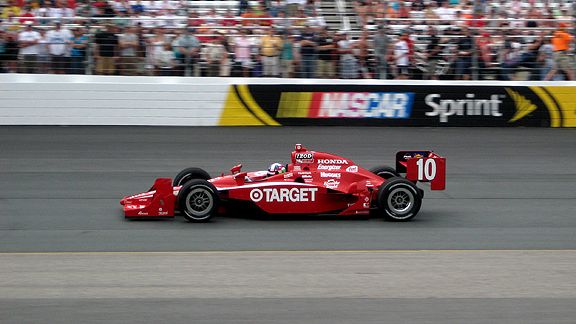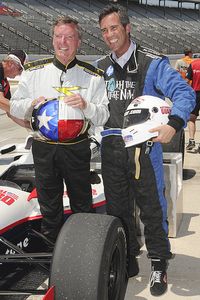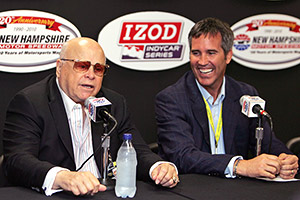Is IndyCar picking a NASCAR fight?

John Oreovicz for ESPN.com IndyCar Series star Dario Franchitti didn't do anything to "mess up" the track before Sunday's NASCAR Sprint Cup Series race at New Hampshire Motor Speedway on Sunday, unless you think it's a bad thing he ran a much faster lap than a stock car could.
LOUDON, N.H. -- Dario Franchitti never led a Sprint Cup race during his brief NASCAR career. But he did Sunday -- sort of.
Immediately before the start of NASCAR's Lenox Industrial Tools 301 at New Hampshire Motor Speedway, Franchitti turned a few demonstration laps in his Target Chip Ganassi Racing Indy car to promote the fact the IZOD IndyCar Series will return to the New England market with a race on July 31, 2011. The laps weren't especially fast (in the 26-second bracket, about three seconds quicker than a stock car but more than four seconds slower than Andre Ribeiro's track record of 21.466 seconds set in 1995 in a CART-spec Indy car) but they sent a powerful message to the American racing community.
Here's why: Whether they acknowledge it or not, IndyCar and NASCAR are competitors. Again, similarly unacknowledged, NHMS owner Speedway Motorsports Inc. (SMI) is a direct competitor to International Speedway Corp. (ISC). ISC and NASCAR are essentially one entity, owned as they are by the France family.
Connecting the dots, Sunday's announcement and demonstration run could be perceived as SMI and IndyCar teaming up to take on the France family and their ISC/NASCAR juggernaut. And even though everyone involved said all the right things, there is no doubt that NASCAR fought the day's activities tooth and nail. When the IndyCar contingent was en route to New Hampshire early Sunday morning, league officials were still in doubt whether NASCAR would allow Franchitti's demonstration run.
On the flight, IndyCar CEO Randy Bernard told a story to illustrate his concern.
"Davey Hamilton [veteran IRL driver and radio commentator] did an Indy car demonstration like this at Las Vegas Motor Speedway many years ago," Bernard said. "They told him to do a couple laps and stay below 175 mph. He didn't want to do that -- he really wanted to show the fans what the car could do, and he did.
"He knew they were going to be mad, but Davey lived in Las Vegas. So he parked his car in a place where he knew he could get out of there in a hurry if there was trouble."
Franchitti didn't have that luxury, because he was tabbed to make the "Start your engines" call for the NASCAR race after his Indy car laps.
All in all, the demonstration went off without a hitch -- and apparently with the blessing of NASCAR president Mike Helton.
"[Helton] said, 'Tell Dario not to crash or blow an engine and mess up our racetrack,'" said NHMS president Jerry Gappens, an Indiana native who was instrumental in luring Indy car racing back to New Hampshire for the first time since 1998.
Of course the ultimate decision rested with SMI CEO Bruton Smith, who was on hand for Sunday's announcement. SMI acquired NHMS for $340 million in 2007, and therefore was not party to Indy car racing's prior history at the "Magic Mile." Four CART-sanctioned races were run at NHMS from 1992 to '95, but attendance dropped from an average of about 50,000 to less than 10,000 when the track's then-owner, Bob Bahre, switched to an Indy Racing League-sanctioned event for 1996-98.
The New Hampshire Indy car race was one of many casualties in the American open-wheel racing war, along with events at several other SMI tracks, including Atlanta Motor Speedway, Charlotte Motor Speedway and Las Vegas.
But the open-wheel landscape has changed dramatically in the last two years, mainly thanks to the so-called unification of the sport. And one of the first things that Bernard -- who has been on the job as IRL CEO for only four months -- said he noticed was a consistent lack of success for IndyCar Series races at ISC tracks. Attendance and promotion at SMI tracks, especially Texas, has always much stronger.
Hence the rapidly growing partnership between the IRL and SMI.
"Mr. Smith is one of my heroes," Bernard said. "The way he promotes is so aggressive, and that's what the IZOD IndyCar Series wants and needs. We have to think in the best interests of the IndyCar Series, and that's why we want to be involved with Mr. Smith."
You can see why Bernard has taken a shine to "Mr. Smith" and vice versa. They're both born promoters who aren't afraid to take chances.
Bernard frequently used the word "aggressive" when talking about Smith and SMI, but there is no doubt that Bernard has been aggressive in his first 100 days on the IRL job. He's already pushed the stagnant future engine formula selection process forward, and he hopes to make an announcement about chassis by July 14.
Bernard has also indicated that major changes could be coming to the IndyCar schedule, which he promised to reveal by "late summer." In addition to the New Hampshire event, IndyCar has already announced a new street race in Baltimore set for the week after NHMS in 2011.
With the schedule to be capped at 17 or 18 races, several existing events are apparently going to be dropped. And the obvious ones are the poorly attended races at ISC tracks -- Homestead-Miami Speedway, Kansas Speedway, Chicagoland Speedway and Watkins Glen International.
On Sunday, Bernard said that IndyCar has a positive relationship with ISC, "But they need to tell us what they can bring to the table that they're not bringing right now."
He didn't rule out one-year contracts to keep some ISC tracks in the fold. "I like one-year contracts, because it keeps everyone hungry," Bernard said. New Hampshire is a one-year deal.
From a business standpoint, a stronger IndyCar Series can only benefit SMI, and ISC for that matter. That's where those France family ties get complicated and conflicted for ISC, because the Frances most certainly do not want to see Indy car racing grow at the expense of NASCAR, but they do want successful events at their tracks.
SMI officials are convinced that despite its checkered past in New England, the New Hampshire Indy car race will be a winner this time around.
"I like Indy car racing," Smith said. "I'm looking forward to bringing Indy cars back to New Hampshire, and I hope y'all are, too. We're going to promote the dickens out of it and make it a national event."
"The difference [from 1998] is that Bruton wasn't the promoter, and it has changed a lot since then," Gappens added. "IndyCar has better drivers, better cars and good momentum. A lot of it is due to Randy."
If anything, Bernard is a man not afraid to make a decision and put it into action. That's what makes his growing relationship with Smith so intriguing. Both of them are willing to take chances and do whatever it takes to make IndyCar events successful.
The Indy car war of 1996-2008 may be over, yet open-wheel racing still has its share of problems and conflicts. But with Bernard acting aggressively as the new sheriff in town, the streets are being cleaned up.
The question to be determined in the next few weeks is whether those streets will continue to include International Speedway Corp. properties.
John Oreovicz covers open-wheel racing for ESPN.com.
©2010 ESPN Internet Ventures. Terms of Use and Privacy Policy and Safety Information/Your California Privacy Rights are applicable to you. All rights reserved.






No hay comentarios.:
Publicar un comentario